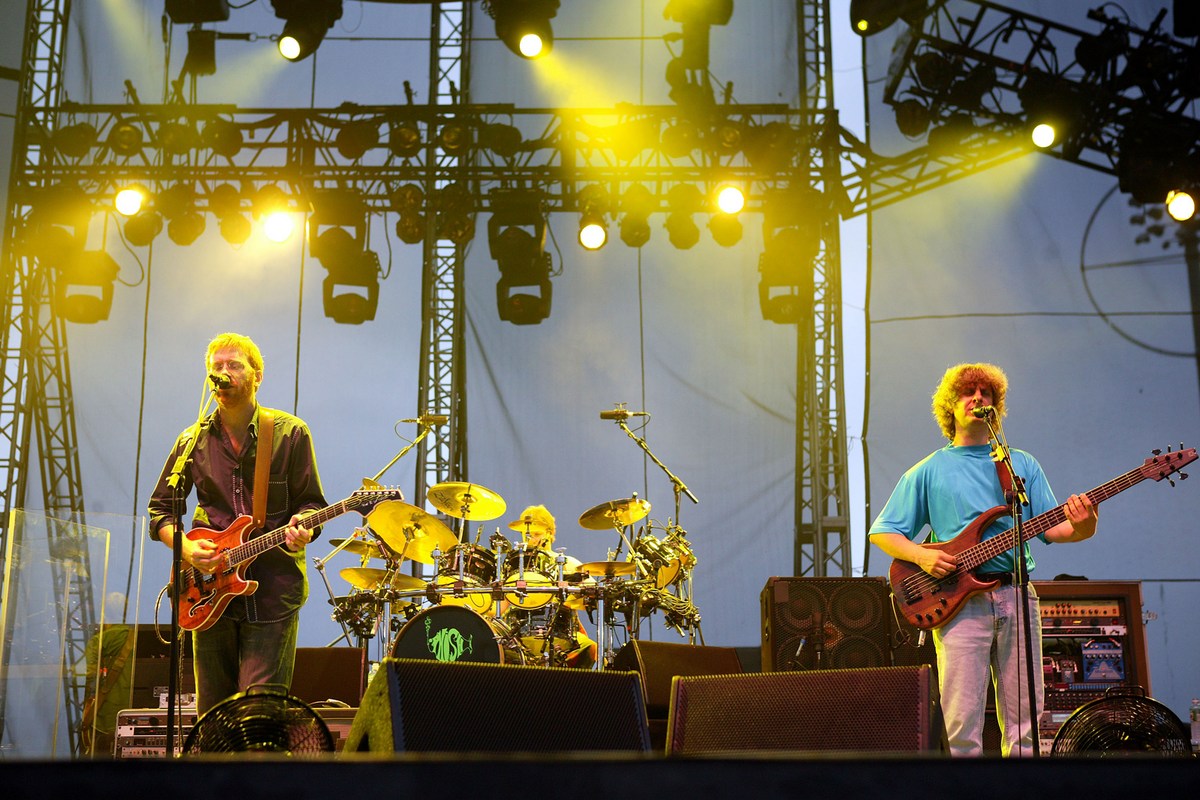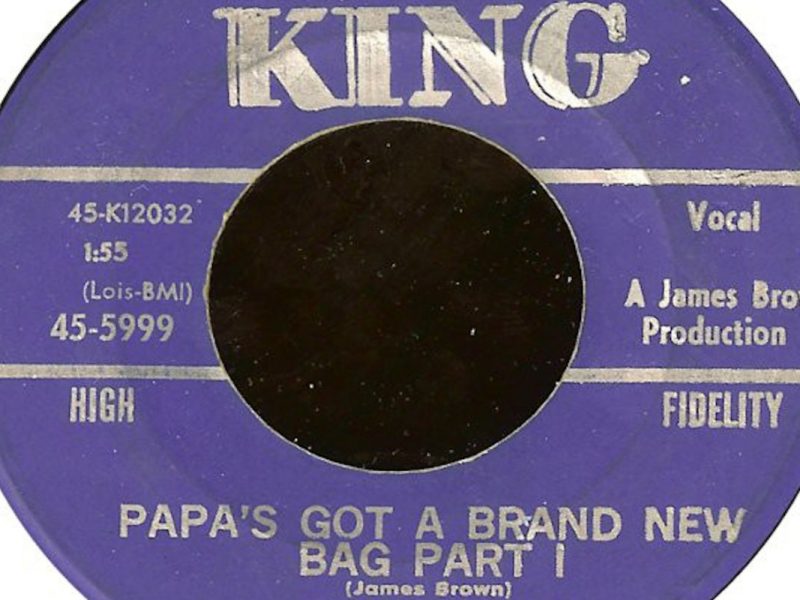As 62,000 Phish fans descended upon the remote town of Limestone, Maine, in August 1997, one might imagine the locals regarding their visitors in a manner akin to an alien invasion. The mostly genial outsiders were headed to the decommissioned Loring Air Force Base for a two-day festival called the Great Went, held Aug. 16 and 17 and featuring two days of music, camping and all kinds of artsy activities and good humor, all centered on the work of the four-man jam band from Vermont. The crowds came in peace and were welcomed by their hosts.
“Everyone was out on their lawns, kids and parents, waving to us,” Rob Foley, a 23-year-old Phish fan, told MTV at the time. “They had signs that said ‘Glad You’re Here,’ ‘Phish Phans Welcome.’ One little kid had a kiddy fishing pole with a sign that said ‘Have Phun.'”
“They were as intrigued by us as we were of them and each local I met was nicer than the next,” recalled Scott Bernstein, editorial director of JamBase. “Most seemed to appreciate the boost to the local economy.”
The Great Went (named after a sequence in the film Twin Peaks: Fire Walk With Me) was the second such event Phish had hosted – a follow-up of sorts to 1996’s Clifford Ball, which they had staged in Plattsburgh, N.Y., in front of 48,000 fans. As the band’s manager John Paluska explained to MTV, Limestone had been selected for a very specific reason.
“By moving it up in extreme northern Maine,” he said, “we figured it would filter out a lot of the more casual onlookers, and filter it down to the people committed to a full weekend experience.”
The Great Went was indeed a success, drawing even more fans than Clifford Ball had and grossing $4.2 million – a hefty chunk of the $10 million Phish earned from their summer shed tour that year, which spanned 15 shows in addition to the two full shows they played at the festival. The band used the location again for two subsequent festivals – Lemonwheel in 1998 and It in 2003.
While the music was certainly the core of the experience at the Great Went, Phish provided an extensive, immersive slate of activities and curiosities to keep fans engaged. There was a corn maze (dubbed a Maze of Maize) in a nearby field, food and craft vendors, a post office with Great Went postmarks and plenty of art installations throughout the property.
Listeners were provided with programs full of live Phish songs and band members’ favorites at WENT – an FCC-sanctioned radio station. Sitting on the left of the dial at 89.1 FM, WENT, according to Phish.net, broadcast each of the band’s performances, traffic reports on arrival and departure dates, a program of Grateful Dead songs, Saturday morning jazz and a collection of original versions of songs the band had covered in concert. Among the band favorites played on the station were tracks by influences such as Sun Ra and the Meters (according to MTV), as well as pop tunes like Captain & Tennille’s “Love Will Keep Us Together” (as seen in the 2000 Phish documentary Bittersweet Motel).
Phish also gave a platform to Spencer Tunick, a performance artist and photographer best known for his large-scale photos of nudes – sometimes thousands of them – in such places as the Sydney Opera House, the Dead Sea and Zocalo, the main square in Mexico City.
At the Great Went, he gathered 1,100 volunteers to disrobe and lie down on one of the former air base’s runways. The resulting photo was striking, appearing to depict a flattened crowd, set against a backdrop of Maine woods. According to Phish.net, each participant was sent a print of the photo that was signed “Best Wishes, Phish Management.”
But the main focus of the festival was Phish’s music: six sets over two days full of energy, playfulness, contemplation and, as always, improvisation. The first Saturday set ran nearly two hours; shortly after a run-through of “Punch You in the Eye,” guitarist Trey Anastasio greeted the gathered crowd.
“I just have to welcome everybody here one time and we’re just going to keep playing and playing and playing for two days, so just get comfortable,” he said. “Walk around and thank you for coming to our Great Went party because it’s a good one and we are, I must say this in the rock ‘n’ roll tradition, yes, we are the biggest city in Maine. We’re bigger than Portland, Maine, right now and not only that, but we are probably a whole lot cooler than Portland, Maine!”
Listen to Phish’s The Great Went
During that set, Anastasio could also be seen encouraging his bandmates to relax and enjoy themselves. In the documentary Bittersweet Motel (which featured footage from the Great Went), the camera followed the band to a backstage area, where Anastasio called the first set “the worst set we’ve played in six months” and explained his onstage encouragement.
“I didn’t know what the fuck was going on,” he said. “Everybody seemed so nervous. The only reason I was saying anything is it was such a beautiful … . Everybody was so tense the first couple tunes. I couldn’t figure out what the fuck was going on. We weren’t doing anything like we normally do. We were playing like shit. And I was kind of like, ‘Hey, you know, we’ve got all weekend.”
“When you said that,” drummer Jon Fishman interrupted, “I thought, ‘I guess Trey’s not having a good time.'”
“I was having a great time,” Anastasio replied. “That’s the only reason I said anything. I was like, why be nervous? It’s our thing. Everybody’s here.”
They finally laughed it off, with Anastasio joking that the band should make a live album called Phish: Five Sets to Redeem Ourself.
Nobody in the audience was privy to this conversation, and most seemed to have fun, if the footage in Bittersweet Motel is any indication. The second and third sets seemed to go off without a hitch, with the band hitting fan favorites like “Wolfman’s Brother,” “Slave to the Traffic Light” and “Lawn Boy,” and covers of Talking Heads’ “Cities” and the Rolling Stones’ “Loving Cup.”
Phish signed off from the stage for the evening after the second encore, but they weren’t finished entertaining. From about 2 a.m. to 3 a.m. Sunday, the band played what amounted to a techno music rave (called a “disco” on handbills distributed around the festival) on top of a flatbed trailer at the entrance to the concert area.
Fan Luann Abrahms, posting on Phish.net, witnessed the set, and reported, “The band had a huge trailer with a lighting rig on it, set up with what Trey had called ‘lots of crappy 70’s keyboards.’ They dug up every Moog and Korg antique they could find for this. … There were strobe lights and a disco mirrored ball, and smoke pouring off of this big semi. … Musically, it sounded like they were going for a techno/industrial kind of thing. … Every once in a while, one of them would say ‘Shake it baby’ or ‘Groove on it’ or something, which would then get sampled and stretched into the rest of the groove.”
Day two of the festival included, in addition to three more Phish sets, a selection of classical music, performed by 20 members of the Bangor Symphony Orchestra, conducted by Dr. Stuart Marrs of the University of Maine. The ensemble played a program of Stravinsky and Debussy, including an hourlong, narrated version of Stravinsky’s L’Histoire du Soldat (“The Soldier’s Tale”).
Listen to Phish’s The Great Went
“The work and our group was introduced to the Phish phans by Trey Anastasio, Phish’s leader, who just prior to our performance requested a short history lesson from me on the genesis of the work,” Marrs recalled. “He dutifully took notes and introduced it to the crowd as a sage professor yields words of wisdom to the admiring class.”
After performing the Stravinsky piece, the conductor indulged in a rock ‘n’ roll moment.
“And it was a strange sensation, indeed,” he remembered. “At the end, after having acknowledged the narrator and the musicians, turning to [62,000] pairs of eyes, raising my arms in acknowledgment of their attention and receiving a roar of appreciation in return.”
The orchestra musicians followed that experience by playing Debussy’s “Claire de Lune” while a glider performed aerial acrobatics over the festival space. “It really was beautiful,” Marrs recalled.
Listen to Phish’s The Great Went
Phish’s performances that day leaned toward the remarkable. A near half-hour “Down With Disease” featured some terrific interplay between Anastasio and bassist Mike Gordon. A 15-minute “Bathtub Gin” sent JamBase’s Scott Bernstein into something of a swoon.
“The ‘Went Gin’ is all about one beautiful riff Trey settles in on and varies ever so slightly to great effect,” he wrote. “For many, the greatness of Phish jams is all about how far the band travels from the typical structure of a song. … The Great Went version of ‘Bathtub Gin’ doesn’t stray too far out of bounds, but the riff Anastasio works into the mix that serves as the basis for the improv is unlike any other he has ever played. … Years later, the ‘Went Gin’ still stands among my favorite moments in Phish history that I saw live.”
Phish also melded the festival’s considerable visual art component into their musical presentation. At various times during their performances on Sunday, band members walked to the side of the stage to add their individual touches to a collective piece of art to the Tower of Art, a large sculpture on the outer edge of the audience area, consisting of pieces of painted wood fans had been adding throughout the weekend.
After a long, funky run through “Also Sprach Zarathustra” (the theme to 2001: A Space Odyssey), Anastasio brought out Phish’s contribution – a large, colorfully decorated piece of thin board – and asked the crowd to pass it back to the tower. As they did, keyboardist Page McConnell played an ethereal chord progression, and Fishman gently tapped his cymbals, starting a tense but quiet jam, while the entire band watched the board slowly float farther away from them, borne on a sea of hands. The sculpture was eventually set aflame, lighting up the sky with the biggest campfire anyone in attendance was likely to ever see.
Listen to Phish’s The Great Went
Such interaction and activity are part of what brought Phish and their fans together for the Great Went and what continues to bring them together today. There is communion – between four musicians performing onstage for hours, in acts of virtuosity and discovery; between those musicians and their audience, listeners touched by those performances, by their nuances and broad strokes alike; between individual audience members toward one another, in acts of empathy and kindness and mutual enjoyment.
That’s what Phish and their audience mean to one another. That’s what they brought to the Great Went.
Phish, The Great Went, Limestone, Maine, Aug. 16-17, 1997
Day 1 (August 16, 1997)
Set 1:
Makisupa Policeman
Harpua
Chalk Dust Torture
Theme From the Bottom
Punch You in the Eye
Ghost
Ginseng Sullivan (Norman Blake cover)
You Enjoy Myself
Train Song
Character Zero
The Squirming Coil
Set 2:
Wolfman’s Brother
Simple
My Soul (Clifton Chenier cover)
Jam
Slave to the Traffic Light
Rocky Top (Felice & Boudleaux Bryant cover)
Julius
Set 3:
Halley’s Comet (Richard Wright cover)
Cities (Talking Heads cover)
Llama
Lawn Boy
Limb by Limb
Funky Bitch (Son Seals cover)
Encore:
Contact
Loving Cup (The Rolling Stones cover)
Day 2 (August 17, 1997)
Set 1:
The Wedge
Beauty of My Dreams (The Del McCoury Band cover)
Dogs Stole Things (Trey Anastasio & Tom Marshall cover)
Vultures (Trey Anastasio and Tom Marshall cover)
Water in the Sky
Maze
Bouncing Around the Room
Tweezer
Taste
Carolina ([traditional] cover)
Set 2:
Down With Disease
Bathtub Gin
Uncle Pen (Bill Monroe and the Bluegrass Boys cover)
Also sprach Zarathustra, op. 30 (Richard Strauss cover)
Jam
Harry Hood
Set 3:
Buffalo Bill
NICU
Weigh
Guyute
Dirt
Scent of a Mule
Prince Caspian
Encore:
When the Circus Comes (Los Lobos cover)
Tweezer Reprise
Top 100 Live Albums
These are more than just concert souvenirs or stage documents from that awesome show you saw last summer.



